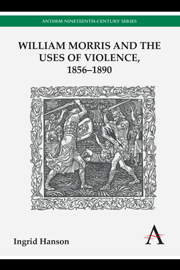Book contents
- Frontmatter
- Contents
- Acknowledgements
- Introduction Warriors Waiting for the Word
- Chapter One The Early Romances and the Transformative Touch of Violence
- Chapter Two Knightly Women and the Imagination of Battle in The Defence of Guenevere, and Other Poems
- Chapter Three Sigurd the Volsung and the Parameters of Manliness
- Chapter Four Crossing the River of Violence: The Germanic Antiwars and the Uncivilized Uses of Work and Play
- Chapter Five ‘All for the Cause’: Fellowship, Sacrifice and Fruitful War
- Afterword ‘Hopeful Strife and Blameless Peace’
- Notes
- Bibliography
- Index
Chapter One - The Early Romances and the Transformative Touch of Violence
Published online by Cambridge University Press: 05 July 2013
- Frontmatter
- Contents
- Acknowledgements
- Introduction Warriors Waiting for the Word
- Chapter One The Early Romances and the Transformative Touch of Violence
- Chapter Two Knightly Women and the Imagination of Battle in The Defence of Guenevere, and Other Poems
- Chapter Three Sigurd the Volsung and the Parameters of Manliness
- Chapter Four Crossing the River of Violence: The Germanic Antiwars and the Uncivilized Uses of Work and Play
- Chapter Five ‘All for the Cause’: Fellowship, Sacrifice and Fruitful War
- Afterword ‘Hopeful Strife and Blameless Peace’
- Notes
- Bibliography
- Index
Summary
In 1856, the year following the publication of Alexander Bain's influential volume of psychophysiology, The Senses and the Intellect, Alfred Tennyson's controversial poem of war, excess and madness, Maud, and Charles Kingsley's historically transposed tale of valiant Elizabethan battle, Westward Ho!, as the much-criticized Crimean War limped to its equivocal end, the young William Morris published his first short stories. They appeared in the shortlived Oxford and Cambridge Magazine, which Morris wrote and edited with his university friends that year. All but one of the eight dreamlike, fragmented tales are set in the heroic medieval past and are concerned with battle, courage, and a search for identity, expressed through the actions and reactions of the individual body.
In the March issue of the magazine was an unsigned article by fellow Oxford student, Richard Watson Dixon, defending the Crimean War and deploring the government's decision to pursue peace negotiations with Russia:
To be summoned to lay down our arms, just at the time when we were becoming habituated to their use, and had nerved ourselves for a long and obstinate struggle; just at the time, moreover, when the tide of success seemed about to set steadily towards us, is in itself a baffling and irritating thing, sufficient to produce lassitude and disgust.
Dixon laments that 'a war so splendidly begun' should be abandoned at this stage. It would be better, he argues, to see through the defeat of Russia and the overthrow of its influence across Europe than to leave the war apparently unfinished, 'the cause of freedom only half-asserted'.
- Type
- Chapter
- Information
- William Morris and the Uses of Violence, 1856–1890 , pp. 1 - 30Publisher: Anthem PressPrint publication year: 2013



